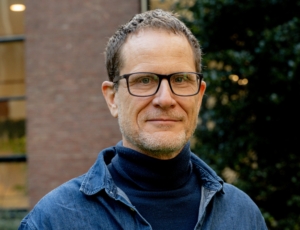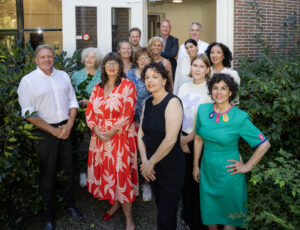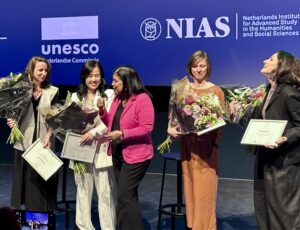Wijnand IJsselsteijn‘The real power of XR is unleashed when it converges with AI. In these virtual environments people’s experiences are real.’
The Distinguished NIAS-Lorentz Fellowship (DNLF) is set up by the Netherlands Institute for Advanced Study (NIAS-KNAW) and the Lorentz Center to promote cutting edge interdisciplinary research. The Fellowship is awarded to a leading scientist working on research that, in essential ways, combines perspectives from the Humanities, Social Sciences, Natural Sciences, and Technological Sciences.
About Wijnand IJsselsteijns research
Wijnand IJsselsteijn’s research is rooted in the cognitive and media psychology, human-computer interaction, and cognitive engineering, with a focus on the psychology of the virtual and the artificial. He has made many contributions to the field of technology development from a user’s perspective, including works on (tele)presence, virtual embodiment, mediated social touch, and social computing. For example, IJsselsteijn pioneered the virtual Rubber Hand Illusion, demonstrating that this illusion can also be simulated in virtual and augmented reality. This was the start of an influential paradigm in the study of body image and enhanced our understanding of how non-biological tools and artefacts may become effectively an extension of one’s functional and experienced self – i.e., one’s body schema and body image. This kind of work also enhances our understanding of the fundamental psychological mechanisms at play when we interact with extended realities such as the metaverse.
Aim fellowship: understanding the psychological and ethical ramifications of the metaverse
With XR’s increased perceptual and interactional realism, avatars and simulated environments are likely to become indistinguishable from the real world. There is ample scientific evidence to suggest that these experiences are likely to carry over outside the realm of the virtual and into the real world of attitudes, preferences, and behaviors. The stakes are high and the metaverse has the potential to become the ultimate marketing and persuasion machine. IJsselsteijn wants to understand both the psychological and ethical ramifications of the metaverse that will have important design and policy implications. His focus will be on the nature of reality perception, and the persuasive potential of XR. The fellowship will allow him the valuable next step: bringing together and bridging the required interdisciplinary perspectives from the behavioral sciences, ethics of technology, and human-centered AI and XR interaction design.
About Wijnand IJsselsteijn
Wijnand IJsselsteijn has a background in artificial intelligence and cognitive neuropsychology from Utrecht University. He obtained his PhD from Eindhoven University of Technology (TU/e) in 2004 on the topic of telepresence. Since 2012, he is full professor of Cognition and Affect in Human-Technology Interaction at TU/e. He has an active research program on the impact of technology (esp. VR and AI) on human psychology, and the use of psychology to improve technology design. His work is focused on enhancing human learning, communication, health and wellbeing, and improving quality of life for people living with dementia.
IJsselsteijn is scientific director of the interdisciplinary Center for Humans and Technology at TU/e. In addition, he is co-director of the Expertise Centre for Dementia & Technology, and scientific board member of the Eindhoven AI Systems Institute. He is co-PI of the NWO Gravitation project “Ethics of Socially Disruptive Technologies”, and project leader of the QoLEAD project. He has published over 300 academic papers and co-edited over 10 books. His work is widely cited (h-index > 70) and applied in academic as well as industry contexts. His recent co-edited books include “Immersed in Media: Telepresence Theory, Measurement, and Technology” (2015) and “Making Design Work: Engaging with Dementia in Context” (2019).
DNLF 2023/24
In the present call for nominations, the Netherlands Institute for Advanced Study and the Lorentz Center have also been able to select neuroscientist Eveline Crone, based at Leiden University and Erasmus University Rotterdam, as the DNLF 2023/24. Crone will start her fellowship at NIAS in September 2023, read more about her research here.
The next call for DNLF nominations will be in January 2024 for the DNLF 2025/26.




